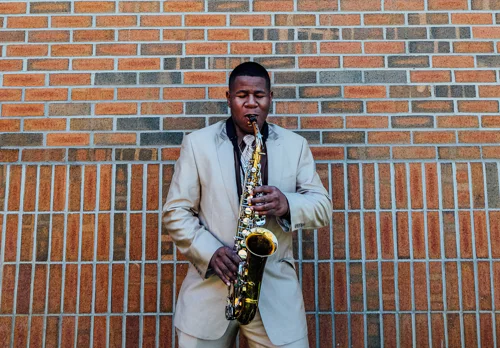The stage of life: Every performance counts
Everyone waits excitedly backstage. The music starts, the curtain rises and the show can begin. The musical performers move light-footedly across the stage, dancing, singing and acting. After one to two hours, the curtain closes again - the show is over. The musical performers are celebrated with thunderous applause and standing ovations because they have thrilled the audience.
Budding performers dream of being part of the star ensemble of major international musicals such as "Tarzan", "The Lion King" and "Dance of the Vampires". You experience fame, don't have to worry financially, travel the world and position yourself perfectly for future jobs.
But the path of a musical performer to the stage (for example on Broadway, in London or Hamburg) is long and difficult. You should be too obsessed with this profession to physically and mentally endure the training to become a musical performer. Constant further training, tight rehearsals and demanding auditions continue to challenge you even after you have completed your training. But if you put your heart and soul into it, becoming a musical performer is much more of an exciting adventure in which you learn a lot about yourself.
What do musical performers actually do?
Musical performers not only bring their roles to life through acting, they must also be able to dance and sing at the highest level at the same time. Thus, a musical performer combines music, dance and spoken theater in one person. In addition, they must be suitable both as a soloist and as a reliable and fully-fledged member of an ensemble.
Each musical has its own character, depending on its artistic orientation, such as chanson, hip-hop, modern jazz, pop, burlesque and improvisation. Furthermore, individual musicals differ according to their target audience. For example, there are special musicals for children that aim to have a playful and entertaining learning effect. The demands on musical performers are therefore very different, which is why a broad repertoire of skills is essential for a musical performer.
Musical performers are often asked what a normal day in their lives looks like. Well, it all depends on what stage they are in - looking for work, in the middle of rehearsals before a premiere or during a season.
Let's assume the last two scenarios. Before a premiere, musical performers rehearse for up to 8 hours a day for several months. They usually do nothing else. Every single performer works hard on their artistic and physical skills so that everything looks easy at the performances later on. During the performance period, the musical performers often only rehearse once a week and have one or two days off. On the day of the show itself, the performers have to be at the theater at least one hour before the show to be made up by the make-up department and equipped with a microphone by the technical department, to put on their costumes and to warm up. Then the show starts.
To be able to give 100% of their performance every day, musical performers have to pay close attention to their health. Some musical performers report that they protect their voice by inhaling hot water for a few minutes every day. Others don't eat chocolate before performances, as it makes the throat mucousy and sticky. To keep their bodies functioning properly, they should eat healthily, avoid excessive consumption of stimulants such as smoking, alcohol and sweets, and make an effort to keep physically fit.
One commitment is not always immediately followed by the next. Sometimes you have to endure longer lean periods in between and live off the savings from your last jobs. A season usually lasts a year, after which the musicals move on to another city, perhaps even another country. If the musical performers have consistently delivered good performances, they are at best allowed to travel with the show and their contract is extended. Constant relocation, financial uncertainty and constantly changing ensembles are all part of the job.
With a life in constant upheaval and away from loved ones, the ensemble automatically replaces the family. You spend a lot of time together, whether at rehearsals or in your free time. Many different nations come together in the large ensemble family, which means that English is the main language spoken. The multicultural exchange is enriching and inspiring, as many musical performers tell us.
Industries in which musical performers find employment:
Film & Television
Musicals, music, spoken word and dance theater
Comedy & Cabaret
music
If you can no longer work as an all-round musical performer for health or age reasons, or because you want to concentrate on one discipline, musical performers have other career prospects to choose from:
Actor
dancer
singer
Dance or singing teacher
Dance or theater teacher
cultural manager
What skills do musical performers have?
Musical performers not only have the obvious talents: acting, dancing and singing, they also have a strong sense of rhythm, are physically fit and demonstrate exceptional body control. They are enthusiastic about being on stage and enjoy presenting themselves to other people. They also enjoy artistic interpretation work and developing or co-creating role profiles. Thanks to their precise powers of observation combined with a high level of empathy, they are able to recognize the smallest differences in facial expressions, gestures and movement in order to perfect the role they are playing.
In addition to technical skills, personal and social skills play an equally important role. Every successful musical performer has experienced a dry spell between engagements and received many rejections. But they have not been discouraged, have accepted criticism, worked on themselves in a disciplined manner and improved themselves in order to get closer to their goals and dreams. This requires a great deal of ambition and passion on the one hand, and absolute perseverance on the other.
Musical performers are also able to cope with the psychological pressure to constantly perform and quickly find a new job. It is not easier to be a lone fighter - on the contrary. Musical performers are aware of this and therefore display a pronounced collegiality when dealing with their colleagues. In addition, the group performance determines the success of the production and the further career path, which may mean another role in a different ensemble. Then it's time to move again and adjust to the new. This demonstrates flexibility in terms of space and time as well as the professionalism to quickly acquire multifaceted roles.
Is training necessary?
If you want to be competitive on the job market as a musical performer, the standard route is professional training at a university or academy where you study musicals. The basic training in acting, dancing and singing takes three years.
The training is no walk in the park and begins with tough entrance examinations. Theoretical and practical modules complete the curriculum of up to 40 hours. You can find the exact requirements, all information about training or studying and help with the application process in the following article: How to become a musical performer?
What do you earn as a musical performer?
The salary of a musical performer depends on the production for which they are booked. According to the collective agreement, musical performers employed by state or municipal theaters receive a starting salary of €1,600 gross. According to the Bühnengenossenschaft, those who work in larger, commercially oriented shows can earn around €3,000 gross per month. Musical performers in leading roles and with star potential, such as "Jane" from "Tarzan", sometimes earn five-figure salaries, but very few are among them. Their salary is usually fixed and does not depend on how often they are on stage. They are also bound to secrecy about their exact income, which is regulated by contract. They are well off, but the working conditions at small, private theaters or on cruise ships are often less luxurious.
The salaries are not high when you consider that artists often have to travel long distances to take part in auditions and even have to pay travel expenses out of their own pockets.
What development opportunities does a musical performer have?
In order to remain successful for a long time, artists should be flexible and constantly develop their skills. The larger your repertoire and the more pronounced your strengths, the more interesting you are for the job market. However, many musical performers leave show business in their mid-30s and change direction. Some of them concentrate exclusively on acting - you can find more detailed information on this in the following article: How to become an actor?
Others become full-time singers, which you can find out more about in the following article: How to become a singer?
Others want to pass on their knowledge by working as a dance teacher, for example. You can read all about what you need to know to do this here: How to become a dancer?
However, those who still want to be involved in the musical business have to prepare themselves for older roles, of which there are only a few.























